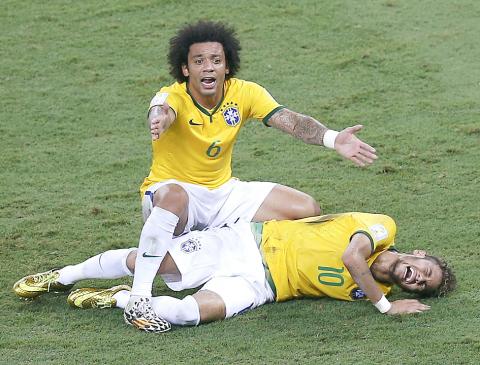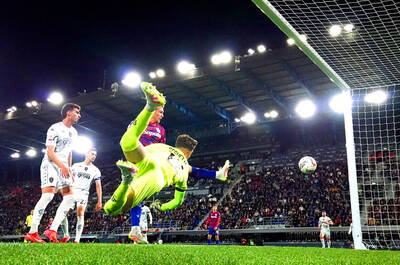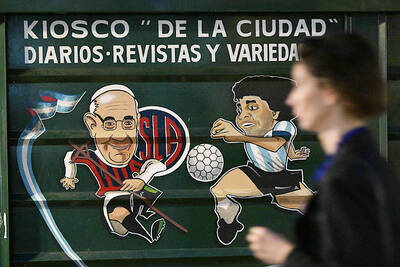The World Cup held potential disaster for Brazil — the country, not the team.
Yet the country pulled off a magnificent tournament, albeit with a few bumps. It was the team that left many Brazilians wondering what went horribly wrong.
The World Cup was widely seen as theirs for the taking, especially on home turf, but they finished in fourth place with their star badly injured and the brutal memory of a 7-1 rout by Germany in front of a global audience.

Photo: Reuters
The most successful nation in World Cup history have been eliminated in three straight tournaments, enough to raise questions about whether Brazil is doing the right things to keep up with countries that have dominated the sport in recent years.
It is already clear Brazil that will not be the same after the tournament.
A change in coach is certain after the confederation announced on Monday that Luiz Felipe Scolari would not be returning, and new players will be joining Neymar and Oscar for next World Cup in Russia.
Critics say bigger changes are needed, including in the local confederation.
The resounding 7-1 loss to Germany, which embarrassed the nation, could become a turning point for the national team. The semi-final defeat has everyone thinking about the need to rebuild.
“We failed. We didn’t play up to expectations, we know it wasn’t a good tournament,” said striker Neymar, who missed the last two matches because of a back injury. “We didn’t play the kind of football that the Brazilian national team plays. It was just regular and that’s why we still reached the semi-finals, but it wasn’t Brazilian football, not the kind of football that enchants everybody.”
Brazil never displayed their traditional jogo bonito and ended the tournament with three wins, two draws and two losses, including 3-0 to the Netherlands in the third-place playoff on Saturday.
“Brazilian football has to evolve in general,” fullback Dani Alves said. “We can’t discredit the work that has been done by this team, but we have to find a way to start restructuring our football from the youth levels up.”
Brazilian Sports Minister Aldo Rebelo blamed some of Brazil’s failings on young players moving early to European clubs. He said parents were given jobs with clubs and took their children along.
“I have already denounced this,” Rebelo said on Monday. “This is a type of football colonialism exercised by rich teams in Europe.”
Brazilian soccer confederation president Jose Maria Marin had said that losing the World Cup at home would be like “going to hell.”
“We need to think football differently,” said Brazilian coach Paulo Autuori, who led Sao Paulo to the FIFA Club World Cup title in 2005. “We need the Brazilian confederation in the hands of people from football. We need people in charge who can think football.”
Marin, a former politician, is leaving the confederation next year and will be replaced by Sao Paulo state federation president Marco Paulo del Nero. Both were politically linked to Ricardo Teixeira, who ruled the confederation for more than 20 years before resigning in 2012 citing medical reasons, and amid a cloud of allegations of corruption and irregularities in his administration.
Del Nero had said he would like Scolari to stay as the head of the national team, despite his failure to win the title at home, but Marin said on Monday that the confederation would not keep the coach after the World Cup. Scolari had said it would be up to the confederation to decide whether he would continue.
Scolari was picked to lead the team mostly because of his popularity and experience from the 2002 World Cup title, but many critics said he was outdated as a coach. Before rejoining the national team, the coach was relegated in the Brazilian league with Palmeiras.
“We should thank him, but we need to choose new people with new thoughts about how to play the Brazilian way,” said former Brazil star Zico, who also blamed Brazil’s problems “on poor administration, a lack of structure and a vacuum of leadership.”
Scolari said Brazil is going through a period in which there are “fewer young promising players” in the country and said that the confederation needs to “keep working” to make sure more appear in the future.
There are a few names already rumored to be the next coach, including Tite and Muricy Ramalho, who have been successful with local clubs in recent years.
Ramalho is a four-time Brazilian champion, while Tite coached the Corinthians team that won the FIFA Club World Cup title in 2012.
There is also talk in local media about international coaches, including Pep Guardiola, Jose Mourinho and Chile’s Argentine coach Jorge Sampaoli.
Regardless of the new coach, many of the players will be changing.
Of the 23 players picked by Scolari for the World Cup in Brazil, only seven will be younger than 30 in Russia — Neymar, Oscar, Marcelo, Luiz Gustavo, Paulinho, Willian and Bernard.
“It was disappointing in the end, but we have to remember that this generation has started a rebuilding process for 2018 with a fourth-place finish at the World Cup,” Scolari said.
Neymar, who will be 26 in Russia, will still be carrying the hopes of the national team for a sixth world title.
“This will hurt for a long time, but we know that better days will come,” the 22-year-old striker said. “We have to do whatever possible to make sure we can make the Brazilian people happy again.”

Bologna on Thursday advanced past Empoli to reach their first Coppa Italia final in more than half a century. Thijs Dallinga’s 87th-minute header earned Bologna a 2-1 win and his side advanced 5-1 on aggregate. Giovanni Fabbian opened the scoring for Bologna with a header seven minutes in. Then Viktor Kovalenko equalized for Empoli in the 30th minute by turning in a rebound to finish off a counterattack. Bologna won the first leg 3-0. In the May 14 final in Rome, Bologna are to face AC Milan, who eliminated city rivals Inter 4-1 on aggregate following a 3-0 win on Wednesday. Bologna last reached the

If the Wild finally break through and win their first playoff series in a decade, Minnesota’s top line likely will be the reason. They were all over the Golden Knights through the first two games of their NHL Western Conference quarter-finals series, which was 1-1 going back to Minnesota for Game 3 today. The Wild tied the series with a 5-2 win on Tuesday. Matt Boldy had three goals and an assist in the first two games, while Kirill Kaprizov produced two goals and three assists. Joel Eriksson Ek, who centers the line, has yet to get on the scoresheet. “I think the biggest

From a commemorative jersey to a stadium in his name, Argentine soccer organizers are planning a slew of tributes to their late “Captain” Pope Francis, eulogized as the ultimate team player. Tributes to the Argentine pontiff, a lifelong lover of the game, who died on Monday at the age of 88, have been peppered with soccer metaphors in his homeland. “Francisco. What a player,” the Argentine Football Federation (AFA) said, describing the first pope from Latin America and the southern hemisphere as a generational talent who “never hogged the ball” and who showed the world “the importance of having an Argentine captain,

Noelvi Marte on Sunday had seven RBIs and hit his first career grand slam with a drive off infielder Jorge Mateo, while Austin Wynn had a career-high six RBIs as the Cincinnati Reds scored their most runs in 26 years in a 24-2 rout of the Baltimore Orioles. Marte finished with five hits, including his eighth-inning homer off Mateo. Wynn hit a three-run homer in the ninth off catcher Gary Sanchez. Cincinnati scored its most runs since a 24-12 win against the Colorado Rockies on May 19, 1999, and finished with 25 hits. Baltimore allowed its most runs since a 30-3 loss to